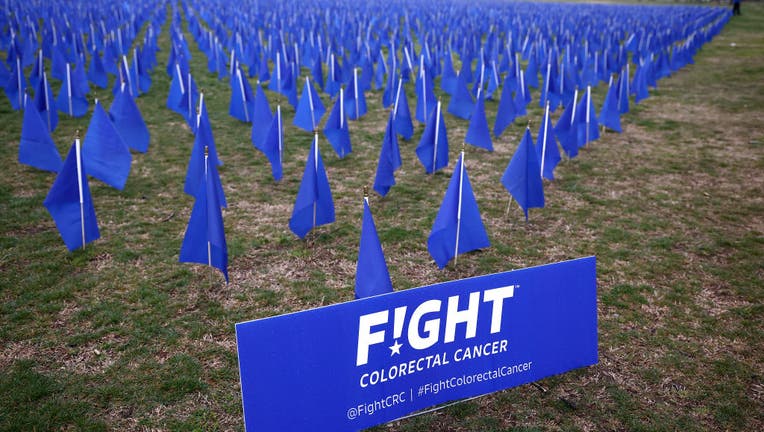Exercise cuts colon cancer recurrence, boosts survival, study finds

Colorectal cancer awareness installation on the National Mall showcasing the increasing number of cases in young adults on March 13, 2023 in Washington, DC. (Photo by Paul Morigi/Getty Images for Fight Colorectal Cancer)
A promising study reveals that exercise can help the recurrence of colon cancer after surgery or chemotherapy, improving chances of survival.
The findings were presented over the weekend at the annual meeting of the American Society of Clinical Oncology (ASCO) and published in the New England Journal of Medicine.
Dig deeper:
Researchers in Canada said its trial was conducted over 17 years, and it was the first to prove that exercise after surgery and chemotherapy improved long-term outcomes for people with colon cancer.
The trial included 889 patients with stage III or high-risk stage II colon cancer who had finished surgery and chemotherapy.
RELATED: Dog detects woman's breast cancer before doctors: 'He knew all along'
The participants were then split into two groups. One group did a structured exercise program with a physiotherapist or kinesiologist, and the other received health education materials about staying active and eating well.
All patients also got regular cancer checkups and follow-up care.

Biden's first remarks since prostate cancer diagnosis
Former President Joe Biden delivered his first public remarks since announcing his prostate cancer diagnosis on May 18. Biden spoke at a Memorial Day event at Veterans Memorial Park in New Castle, Delaware.
Patients in the exercise group were then encouraged to add 2.5 hours of moderate exercise to their weekly routine. They met with exercise specialists every two weeks in the first year and once a month for the next two years.
The support helped them stick to their exercise goals, and many said that having guidance and accountability was key to their success.
Why you should care:
The results should that after five years, 80% of patients in the exercise group were cancer-free, compared to 74% in the education-only group.
The exercise group had a 28% lower risk of cancer coming back or new cancers forming.
RELATED: Researchers at Long Island lab discover breakthrough that slows pancreatic cancer progression
After eight years, 90% of the exercise group was still alive, compared to 83% in the other group—a 37% lower risk of death for those who followed the structured exercise program.
What they're saying:
"As oncologists, one of the most common questions we are asked is ‘What else can I do to improve my outcome?’" Dr. Christopher Booth (Professor, Departments of Oncology and Medicine), medical oncologist at KHSC, who co-chaired the study said in an online news release.
"Exercise is no longer just a quality-of-life intervention – it is a treatment for colon cancer," Dr. Kerry Courneya added.
The Source: The information in the story comes from a major Canadian clinical trial that was conducted over 17 years and involved 889 patients with stage III or high-risk stage II colon cancer. The findings were presented at the annual meeting of the American Society of Clinical Oncology (ASCO) and published in the New England Journal of Medicine. This story was reported from Los Angeles.

